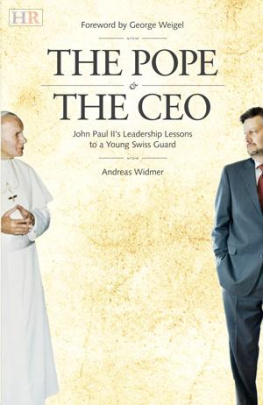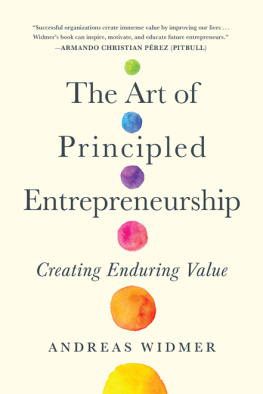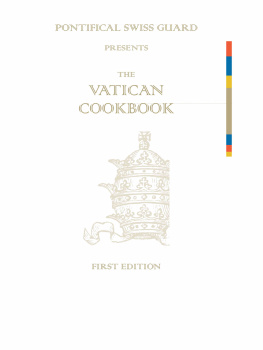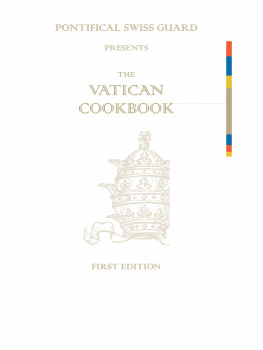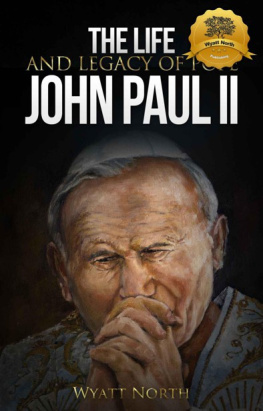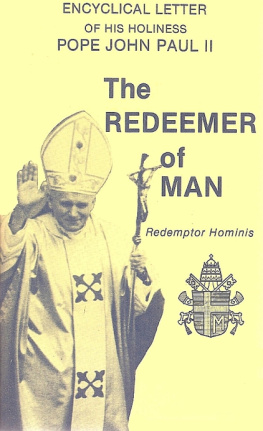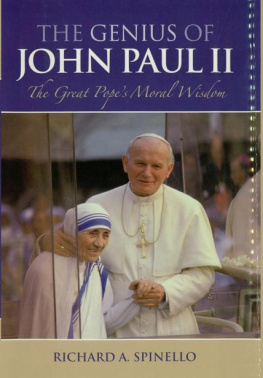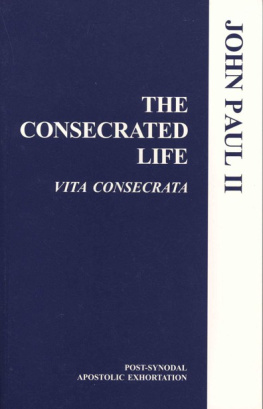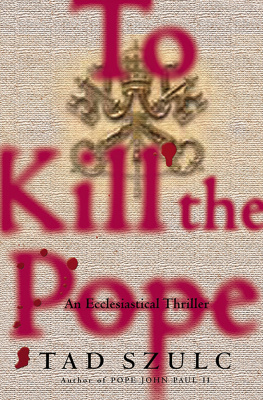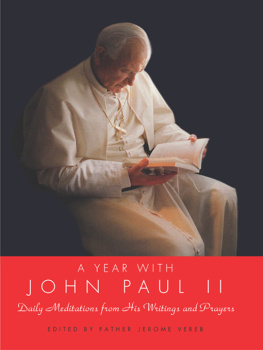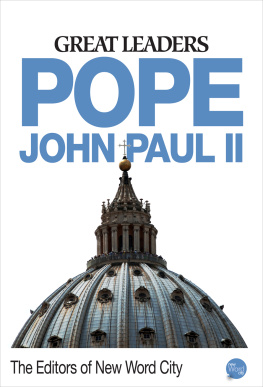THE POPE & THE CEO
John Paul ll's Leadership Lessons to aYoung Swiss Guard
Andreas Widmer
Foreword by GeorgeWeigel

Steubenville, Ohio A Divisionof Catholics
United for the Faithemmausroad.org
Emmaus Road Publishing 827North Fourth Street Steubenville, Ohio 43952
2011 by Andreas Widmer Allrights reserved.
Published 2011 Printed inUnited States of America
Library of Congress ControlNumber: 2011934212
ISBN: 9781931018760
Unless otherwise indicated,Scripture texts in this work are taken from the New American Bible with RevisedNew Testament and Revised Psalms 1991, 1986, 1970 Confraternity of ChristianDoctrine, Washington, D.C. and are used by permission of the copyright owner.All Rights Reserved. No part of the New American Bible may be reproduced in anyform without permission in writing from the copyright owner.
The Holy Bible, NewInternational Version NIV Copyright 1973, 1978, 1984, 2011 by Biblica, Inc.Used by permission. All rights reserved worldwide.
Revised Standard Version ofthe BibleSecond Catholic Edition (Ignatius Edition) Copyright 2006 NationalCouncil of the Churches of Christ in the United States of America. Used bypermission. All rights reserved.
Cover design:KarinRabensteiner
Layout & Design: TheresaWestling
Cover artwork:
ServizioFotografico-L'Osservatore Romano
Michelle WidmerSchultzPhotography
For Michelle andElias
And in homage toBlessed Pope John Paul II
Table of Contents
Foreword
Opening the NBC News coverage ofPope John Paul II's funeral Mass on April 8, 2005, anchor Brian Williamswelcomed his audience to "the human event of a generation." It was anapt phrase, not only because of the vast throngs that had flocked to Rome tosay goodbye to John Paul, but because the late pope had touched human livesacross a remarkable spectrum of humanity during his twenty-six and a half yearsas Bishop of Rome.
Andreas Widmer's was one of thelives John Paul II touched.
Andreas's own story is a compellingone of faith, success, failure, redirection, and the discovery of what is trulyimportant in a genuinely human life. But I'll let him tell that story in thefine book you're about to read. As John Paul II's biographer, I'd like tohighlight several key ideas taught by the late pope: ideas that Andreas Widmerlearned (sometimes the hard way) and ideas that he now wants to share withothers.
The first of these Big Ideas is thatlife is vocational. The word "vocation" comes from the Latin verb vocare , "to call," such that a vocationis a calling. It's not a career, in the conventional sense of that word. It's amatter of listening to the promptings of God, and then discerning what uniquething God has in mind for my life. John Paul II was convinced that every humanlife is a drama, a vocational play in multiple acts, which is playing withinthe larger cosmic drama of God's creative, redemptive, and sanctifyingpurposes. To live life as a vocational drama is to live a bracingly humanlifeit's the greatest of human adventures. And, as John Paul taught andAndreas Widmer learned, business can be a real vocation.
The second of these Big Ideas isthat things have a purpose, even things that seem random or accidental. Nothingin our lives, John Paul used to say, is a "coincidence." What seemsto be "coincidence" is really an aspect of divine providence that wedon't understand yet. If we can learn to look at our lives in those terms,we'll never succumb to the most deadening of human temptationsthe temptationto boredom.
The third of these Big Ideasinvolves expectations. From the mid-1990s on, I was constantly asked why PopeJohn Paul II was such a magnet for young people. One reason, I'm convinced, isthat he didn't pander to the young; rather, he challenged them. In multiplevariations on the same great theme, the pope would say, again and again,"Don't ever settle for anything less than the spiritual and moralgreatness the grace of God makes possible in your life. You'll fail; we all do.But that's no reason to lower the bar of expectation. Get up, dust yourselfoff, seek forgiveness and reconciliation, and then keep trying. But don't ever settle for being less than the noble humanbeingthe leader and exemplaryou can be."
Christians call that nobility"sanctity," and the challenge to nobility and sanctity that John PaulII offered was Not-For-Young-People-Only. Why? Because being a saint is everybaptized person's human, as well as Christian, destiny.
When the Catholic Church beatifiedJohn Paul II on May 1, 2011, the Church was bearing public witness to itsconviction that this was a life of heroic virtue, a life that could be held upfor others to emulate. At the same time, the extraordinary response John PaulII drew from men and women who were neither Catholics nor Christians, nor evenreligious believers, bore testimony to the fact that a saintly life is acompelling human life. The saints are not men and women who have somehow leaptabove the human condition; the saints are men and women who have lived fullyhuman lives through the power of grace.
Andreas Widmer is an honest man, agood man, and an insightful man. His reflections on what he learned fromperhaps the greatest Christian of our time offer all of us a powerful exampleof leadership at work.
George Weigel
Preface
The Pope& The CEO is a guidebook for people seeking to integrate faith intoall aspects of their lives. It is inspired by the example of Pope John Paul II.As a Swiss Guard in my early twenties, I was privileged to live very close tohim, one of the great leaders of the 20th century. John Paul's sincerityimpressed me, both in his faith and how he brought that faith to all aspects ofhis life. His example had a tremendous effect on my life. This book is myeffort to share the lessons I learned from his example, based primarily on mymemories of John Paul II during the two years I was tasked with protecting him.It also tells the story of how those memories later directed me in my quest tolive my Catholic faith as a corporate executive and CEO.
There are biographical andautobiographical elements to this book. Occasional stories are not my own orare ones that I witnessed, along with the rest of the world, through the lensof the media. The book offers glimpses into the life of a Swiss Guard at theVatican.
The pages that follow, however, areprimarily intended to help the Christian executive, CEO, entrepreneur, or smallbusiness owner learn some key principles of successful leadership, as I did, atthe feet of John Paul II. It is my hope that the head of anyorganizationfamily, school, church, or associationwill see a readyapplication, and will benefit from this book and its lessons.
I myself didn't learn those lessonsright away. It took me years to see the connections between the pope I onceserved and the work I did everyday. I had to make and lose millions of dollarsbefore I began to understand how blessed I was by my time at the Vatican andhow much John Paul II had taught me.
This book is the book I wish someone had given metwenty years ago. It makes explicit all the lessons that I had to learn thehard way, through my own failures. It also contains the lessons I'm stilllearning, lessons that my intellect grasps, but that are more easily understoodin theory than lived in practice.
HowTo Use This Book
The Pope& The CEO is divided into nine chapters or lessons. Each containsseveral stories or reflections about John Paul II, as well as practicalapplications and a good dose of Church teaching. I try in each chapter toconnect that teaching to the world of business and make it as relevant aspossible to the experience of those tasked with leading a team of people,whether big or small.
Next page
